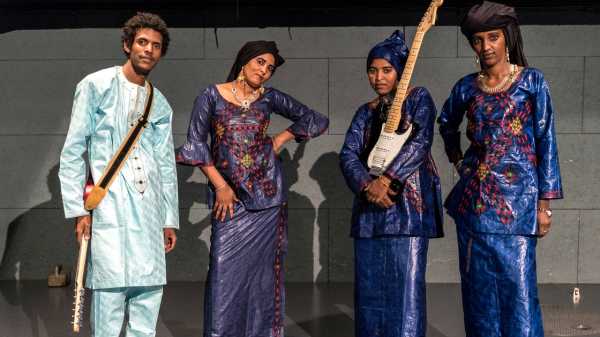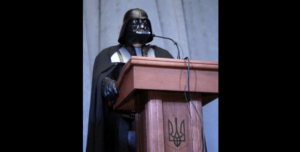
Last month, on a warm Tuesday evening, Les Filles de Illighadad—a guitar-based Tuareg quartet from western Niger—played for a sold-out crowd at Pioneer Works, an art and performance space in Red Hook, Brooklyn. This was the first time the band (Fatou Seidi Gali, Alamnou Akirwini, Fitimata Ahmadelher, and Abdoulaye Madassane) had toured the United States. The group’s name translates to “The Girls of Illighadad,” but their touring incarnation includes one gentleman (Madassane, Gali’s brother, who mostly plays rhythm guitar). The crowd in Brooklyn was entranced, nearly reverent. Les Filles’ music is mesmeric, almost prayer-like, which can leave an audience agog; the group’s members speak French but not much English, which at first made it difficult for them to effectively cajole the room into dancing. Eventually, the music communicated something unambiguous. Whatever rhythm does to a human body—it was happening. By the end of the evening, people had abandoned their rickety folding chairs and little plastic cups of wine to boogie with abandon.
Les Filles de Illighadad has released two albums: a self-titled LP, in 2016, and “Eghass Malan,” from 2017. Both records are heavy, meditative, and tender. At times, their work reminds me, in a not entirely illogical way, of the rhythmic, electric-guitar-based blues and fife-and-drum music of north Mississippi’s Hill Country—from players like R. L. Burnside or Otha Turner, who were directly informed by African music seeded in the American South by slaves. If you listen long enough, and make yourself open enough, it is possible to reach a kind of holy place while experiencing Les Filles. The edges of your consciousness will blur a little. The road will stop seeming so straight.
The band is signed to Sahel Sounds, an independent record label founded in 2009 by Christopher Kirkley, a Portland, Oregon-based producer and a sort of vigilante ethnomusicologist. He has been making field recordings and posting them to the Sahel Sounds blog for more than a decade. Geographically, the Sahel is roughly defined as the semi-arid region bordered by the Sahara Desert, to the north, and the Sudanian Savanna, to the south, and is populated traditionally by nomadic tribes; Kirkley first visited the region in 2009, and stayed for nearly two years. Unlike the majority of his field-recording forebears, Kirkley is cognizant of and sympathetic to the optics of the endeavor—that he is another entry in a long lineage of white men who have inadvertently or purposefully appointed themselves protectors of black music. He is open about the label’s financial dealings (all profits from album sales are divided equally, half to the group and half to the label), and he is driven, he has said, by a respect and admiration for contemporary African music, and by a desire to share both that work and the culture that nurtured it with a broader audience.
Untangling this particular paradox—that a white person might help preserve black music by recording it, while also understanding that recording itself is a largely modern, Western way of thinking about preservation, and that racism is often the reason the music needs “preserving” to begin with—is inevitably at the center of every probing conversation about the harmonic and cultural history of American music. I thought about it endlessly while writing a book about the mostly white collectors of rare 78-r.p.m. records (the rarest and most expensive of which were made by poorly paid black musicians, often from rural areas). Over time, I learned that a person can be uncomfortable with the transaction, but still wildly, selfishly grateful for it.
Perhaps what most distinguishes Kirkley from a figure like Alan Lomax, who first began making field recordings in the nineteen-thirties, is his self-awareness. (That, perhaps, is the greatest gift of doing field work of any sort in the twenty-first century.) “This is something I always think about,” he told me recently. “But I don’t know if I have an answer. It’s a big question.” Because of that, he doesn’t worry much over the precedents, or how he fits into the line. “I’m woefully uninformed about Alan Lomax besides the recordings that I’ve heard,” he admitted. We are now living in an era in which the phrase “cultural appropriation” is so familiar it nearly feels clichéd to invoke it, but it seems possible that listeners are again becoming open to cross-cultural exchange, when it’s enacted with real mindfulness and care. In 2014, Kirkley went to Illighadad to meet with Gali. He described the region as a dry scrubland desert, with twisted trees and grasses. “The village of Illighadad has maybe thirty mud houses and a water tower,” he said. “There are hundreds or thousands of animals—cattle, sheep, goats, camels—walking around freely.”
It is sometimes difficult to describe Les Filles de Illighadad’s sound, in part because it has few precedents, and in part because it’s a hybrid of two isolated traditions, one ancient and one modern. It combines tende, a traditional, percussive folk music performed exclusively by women on a goatskin drum, with newer, guitar-based Tuareg music, which has historically been made by men. In the last few decades, the Sahel has produced some wildly talented electric guitarists, including Omara (Bombino) Moctar, Mdou Moctar (his “Akounak Tedalat Taha Tazoughai,” or “Rain the Color of Blue With a Little Red in It,” is a staggering and awesome adaptation of Prince’s “Purple Rain”), and Ibrahim Ag Alhabib, of the so-called desert-rock group Tinariwen. “Les Filles de Illighadad are often celebrated as being some of the first female Tuareg guitar players, which is of course very special,” Kirkley said. He considers their music a kind of circling back, the closing of some mysterious circle: tende informed Tuareg guitar, and now the tradition is folding in on itself. “Tuareg guitar music was invented by musicians in exile, who were creating a sound that echoed the tende music of the camps. So in a way, this innovation is a return to form.”
A funny danger for any scholar of vernacular music—amateur or otherwise—is letting the listening process become too cerebral, a distancing puzzle of influence and origin. At Pioneer Works, Les Filles de Illighdad’s music felt especially alive, almost instinctive: Gali is a generous and sometimes exuberant guitar player, and she and her bandmates often locked into rich, immersive rhythms. After the show, Gali and Ahmadelher were standing outside, near the venue’s side door. One by one, I watched members of the audience walk by, shyly, and say thank you.
Sourse: newyorker.com



